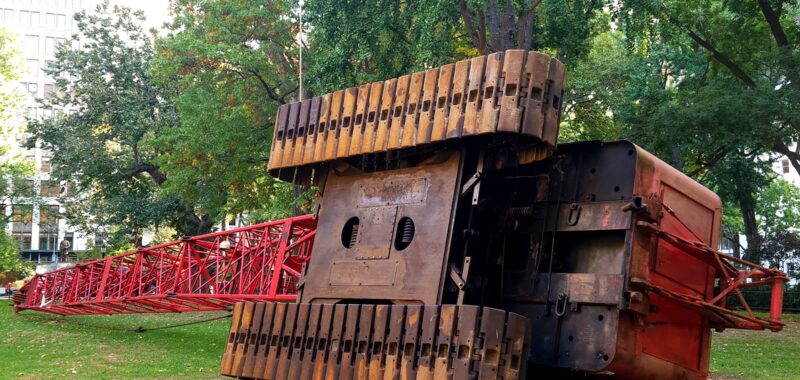If you passed by Madison Square Park in Manhattan this morning, you might have noticed a very large red crane lying on its side on one of the main lawns across from the busy dog runs. Rest assured that it’s not a construction project gone terribly wrong, but rather the Madison Square Park Conservancy’s latest contemporary art commission.
Nicole Eisenman’s “Fixed Crane” (2024) closes out the Conservancy’s milestone 20th anniversary as the fourth and final installation of the year, and will remain on view until March 9, 2025.
So why a crane of all things? And why is it taking a nap instead of standing upright?
Introducing the project this morning, October 23, ahead of the official opening tomorrow evening, Eisenman explained that the idea behind the construction vehicle has everything to do with land use decisions and the perceptions of achievement through urban development in New York City. The crane is presented laterally rather than at its monumental scale — perhaps commenting on diminishing investments in accessible, resource-oriented public spaces as private developers continue their race to the top to benefit those already looking down from the umpteenth level.

“I love a dynamic skyline as much as the next guy, but shouldn’t these over-scaled and opulent building projects have to participate in the life of the city and not simply be citadels for the rich?” Eisenman remarked during her rundown of the project, bringing up a personal account of watching how a bustling supermarket near her studio was converted into an empty lobby that’s only accessible to a few.
Eisenman brings this desire to fruition by placing the crane, a 1969 Link-Belt brought in from Tennessee, in the public park, scattering some of its weighty parts into clusters of accessible seating around the lawn that’s usually fenced shut. The artist has added some subtle embellishments on the vehicle as well, inviting a closer look if not encouraging playtime. There’s even a little secret peephole with a special surprise inside for the insatiably curious.
Stripped of its daunting height and left to be reclaimed by the people, “Fixed Crane” is meant to project a worthy future rooted in what the human mind is capable of accomplishing.
“I can imagine it as a giant Tonka toy that’s been knocked over,” Eisenman said. “The crane, lying down in its urban pasture, has opted out. It’s dreaming of what could be.”




